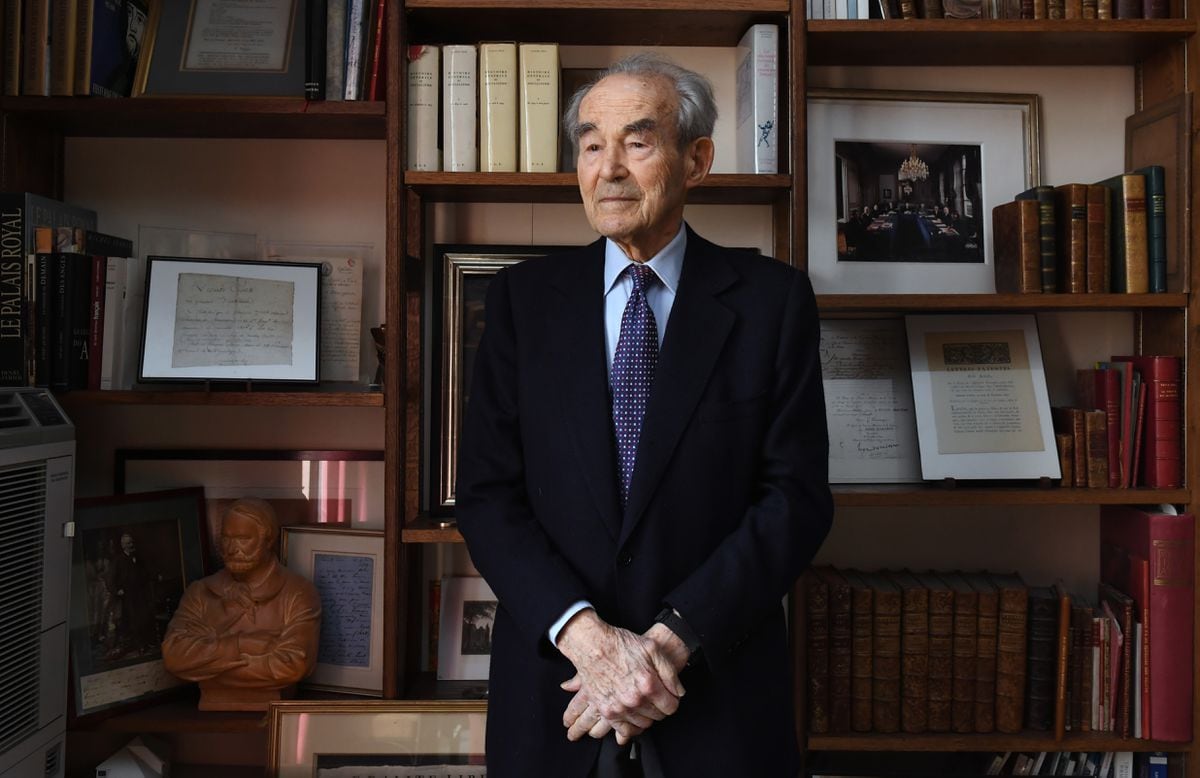Robert Badinter, the man who abolished the death penalty in France in 1981 as Minister of Justice under Socialist President François Mitterrand, died this Friday at the age of 95.
This jurist, who during his youth served as a defender of prisoners sentenced to capital punishment, was a member of the French Socialist Party, minister between 1981 and 1986, and a great moral reference for France.
He was born in Paris into a Jewish family from Romania and his father was arrested by the Gestapo during World War II, when Badinter was only 14 years old, and deported to the Sobibor extermination camp, where he was murdered.
One of his first measures as Minister of Justice was to present a bill to abolish the guillotine.
Three people had been executed in France between 1976 and 1977 under the Presidency of Mitterrand's conservative predecessor, Valery Giscard d'Estaing.
After a heated debate in the Senate, on October 9, 1981, the law abolishing the death penalty for all crimes was officially promulgated.
The French president, Emmanuel Macron, has written in X: “Robert Badinter was always on the side of the Enlightenment.
He was a figure of the century, a republican conscience, the French spirit.”
A Jewish intellectual, Badinter was the target of hatred from the French right, a hatred partly tinged with anti-Semitism.
In 1982, he instructed the courts to crack down on organized crime and terrorism, while avoiding overcrowding prisons with petty criminals.
Between March 1986 — when Mitterrand's camp lost the general election to a conservative coalition led by Jacques Chirac — and March 1995, he was president of the Constitutional Council.
He later was a member of the French Senate, between 1995 and 2011.
In an interview given to this newspaper in 2010, Robert Badinter recalled how ending the guillotine against dominant public opinion brought him “the honor of being the most unpopular minister in France.”
“When he went into a restaurant with Elisabeth [his wife, a famous feminist with whom he shared struggles], he was unbearable.
Someone always shouted: 'The murderers are outside!' He said, imitating the screamer.
In September 1981, when the law was passed, 62% of French people were in favor of the death penalty.
Two years later, in May 1983, two police officers were killed in the center of Paris by two robbers and another officer was seriously injured.
Days later, a thousand police officers demonstrated in the capital and several hundred in various provincial cities, while chanting: “Badinter, go to jail;
Badinter, murderer!
The then Minister of Justice argued that firmness alone did not solve things.
And in response to accusations promoted by the right wing stating that with the arrival of the socialists there was more violence, the Government provided the figures: in its first two years in power, 17 agents died in the act of duty.
While in the previous two years 30 police officers were murdered, almost double.
And this, despite the fact that the death penalty was in force and the exceptional courts that Mitterrand's Executive would be responsible for abolishing.
In that interview, he continued advocating for the extinction of the death penalty in the world: “Age does not exclude passion.
There are causes that I will fight for as long as I have breath, such as the abolition of the death penalty, the conditions of prisoners or the fight against crimes against humanity.”
At 94 years old, Badinter spoke out in another interview held at his home in Paris in April 2022 against the massacre perpetrated weeks before by Russian soldiers in the Ukrainian city of Bucha.
“The Russian offensive in Ukraine,” he warned, represents “the moment of truth for international criminal justice and international law.”
Robert Badinter plays the piano at his home in Paris on October 7, 2010.Claudio Alvarez
Badinter was fond of the piano, he considered himself a devotee of Goya, and during his time as minister he used to visit the homes of famous writers with Mitterrand: “We had a common passion for the places where writers wrote, so we went on Saturdays to the houses of Montesquieu, Victor Hugo, Montaigne... And by the way, to see churches.
Mitterrand had a passion, which I do not share, for cemeteries, and he began: 'Look, what a beautiful tomb, it belonged to an old archbishop...'”, Badinter told this newspaper imitating Mitterrand's voice.
"I told him: 'Come on, I've already seen three.'
I miss him a lot, because we had so much fun... It seems absurd... Even in the Elysée.
Politics is not always sad.
That is an error.
Especially when you have a lot of humor, which was the case with Mr. Mitterrand.”
Follow all the international information on
and
X
, or in
our weekly newsletter
.

